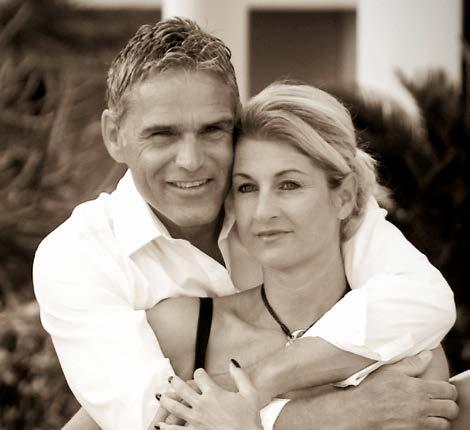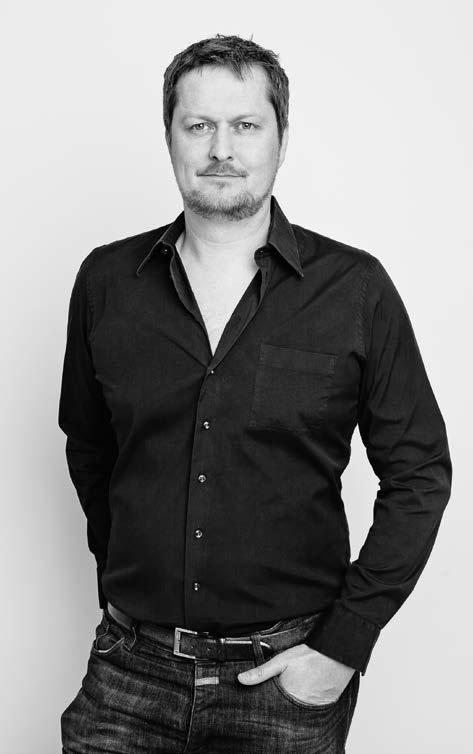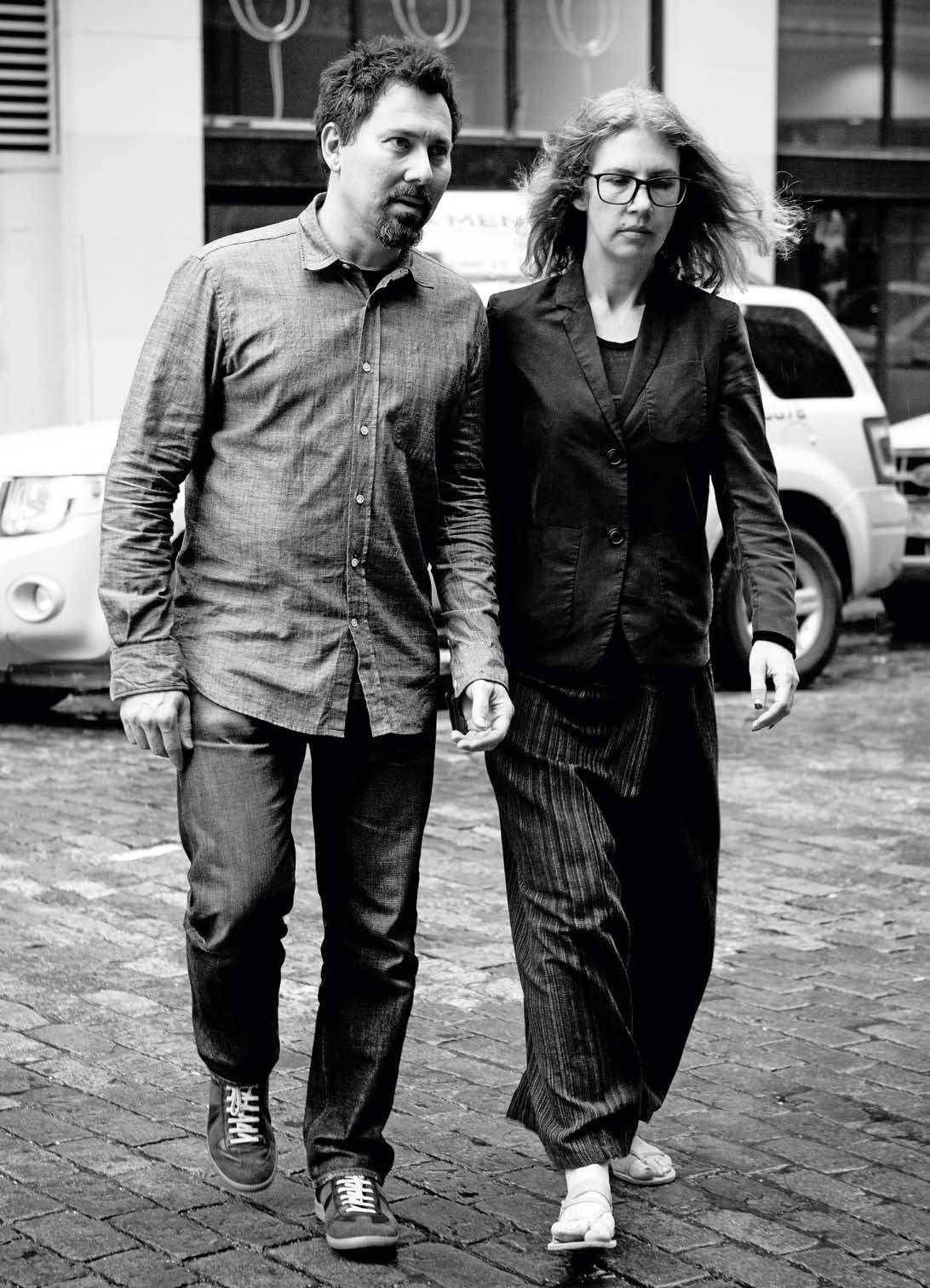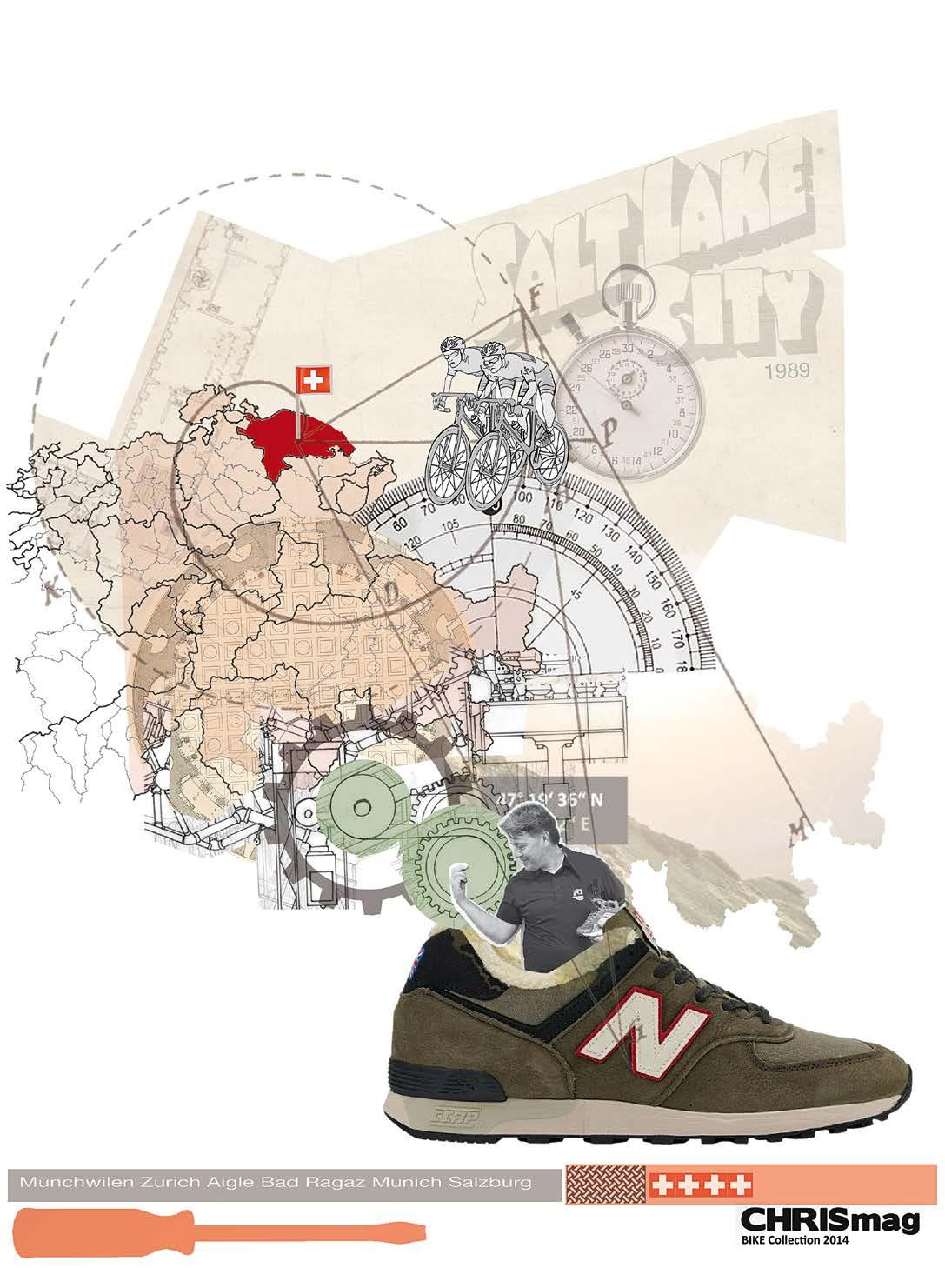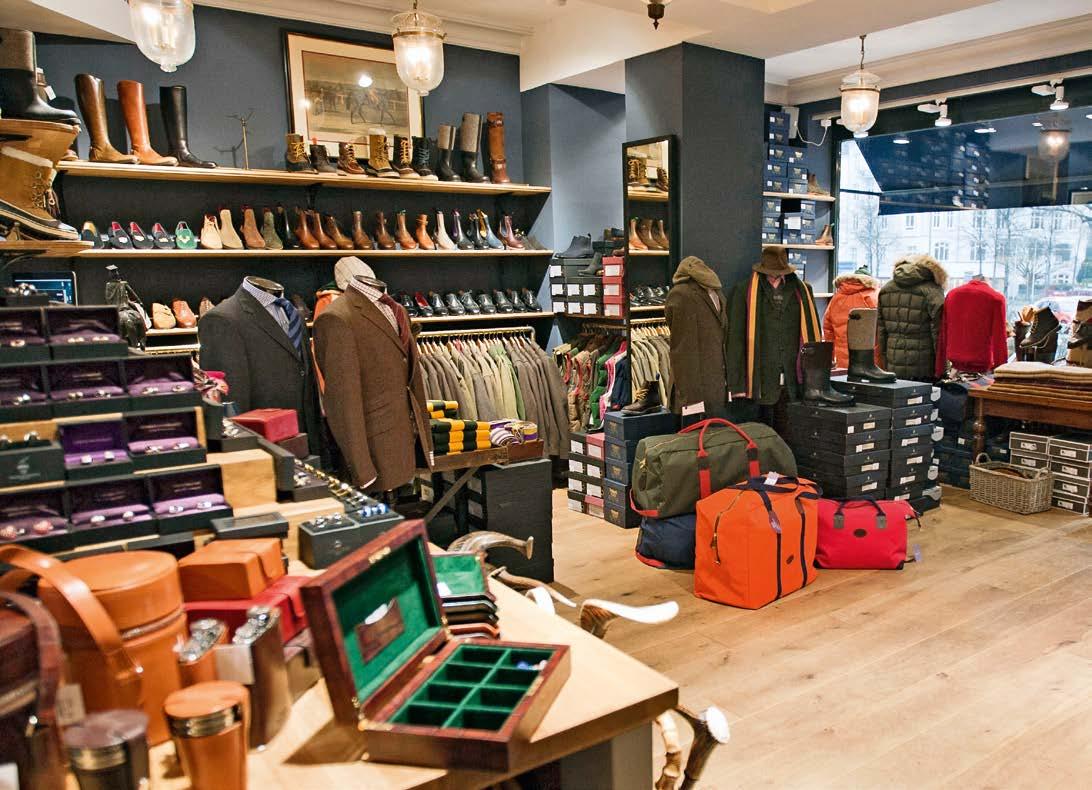
15 minute read
The Paris-Tokyo-Brooklyn Connection
Bicycles on the wall on the upper floor remind the visitors that Kin- folk offers more than just fashion.

Kinf ol k St ore / Br ookl yn . In their fashion store, a highly active international lifestyle collective agreed on a clear aesthetic orientation.
Text: Petrina Engelke, Photos: Kinfolk We see a record player, a bicycle on the wall, Japanese jackets, colourful socks, and vintage design magazines. On first glance this may seem like yet another hipster store in the over-trendy Williamsburg neighbourhood, but this shop actually has a long, branched, and worldly history. The story begins in a bar in Tokyo’s Nakameguro district. The Kinfolk Lounge is a meeting place for cool young Americans and Europeans who are travelling or working abroad. The Kinfolk founders want to offer products and services that they are looking for themselves in vain, such as custom-made bicycles which are manufactured by a Japanese master of his craft.
From Expat Venue to Fashion Store
After moving to Brooklyn (the mother cell in Tokyo still exists) they still have no trouble finding work to do - and followers. A combination of coffee shop, restaurant, and bar is once again a meeting point for like-minded people. The bicycles are being shipped to buyers all over the globe and the in-house design agency of the Kinfolk team does commissioned work for clients such as the Ace Hotel in downtown Los Angeles. The store also added men’s fashion to his repertoire at the beginning of the year. “As soon as we like something and believe it could make sense

in respect to our business, we think about how we could integrate it into the Kinfolk brand”, says Jay Perie. In Brooklyn, the Frenchman was reunited with his friends from the bar in Tokyo, joined the Kinfolk team, and is now responsible for the fashion store. “I’ve never had this much creative freedom when it comes to fashion”, explains Perie. He previously worked in the fashion marketing industry for companies such as Tokyo-based label Bedwin & The Heartbreakers. Selected items of that collection are now on display in the Kinfolk store. The Parisian label Bleu de Paname was, however, not brought into the shop from his homeland. He only discovered it during his time in Japan and asked friends to make contact before the grand opening of the store in Brooklyn. “I make contact with many designers via the friends of friends”, Perie laughs.
Style Guide - Outdoor, Avant-garde, Heritage
Compared to this fairly casual approach, the product range of Kinfolk is subject to rules that seem fairly strict. Even though the brand owners all have differing clothing styles and could not agree on more than the term “authentic”, the store should still always follow clear aesthetic rules. Perie defines the three directions as Outdoor, Avant-garde, and Heritage. Perie believes that there are hardly any men who still wear one style exclusively. The fact that Kinfolk is currently only offering men’s fashion is down to the collective members. “Men’s fashion is quite simply what we do best”, says Perie. The shelf at the side of the store is where it gets very personal. Most of the items on display there are from the households of the Kinfolk team and are actually for sale. The range includes a ceramic rabbit, a toy truck, old records, chic yellowed card decks, and a Polaroid camera. The shelf also houses Playboy cufflinks that the owner doesn’t really want to sell, Perie explains. These little peculiarities are what ensure that the Kinfolk boutique is also a meeting point for like-minded people. Soon they can turn night into day, as the space behind the avant-garde wooden wall designed by Kinfolk is currently being turned into an event hall.
Kinfo lk Sto re
94 Wythe Avenue, Brooklyn, NY 11249 Tel. +1 347-689-4939 http://kinfolklife.com/94wythe Opening: January 2014 Employees: 4 Sales area: approx. 110 sqm (approx. 1,200 square feet) Men’s brands: AXS Folk Technology, Bedwin & The Heartbreakers, Bleu de Paname, Brown’s Beach Cloth, Kinfolk, Knickerbocker MFG, La Paz, Lewis Leathers, Mt. Ranier, Maharishi, Maiden Noir, Metaphore, Shanana Mils ,Wings + Horns, The Wyler Clothing Co. Cosmetics and accessories brands: Emgie Libris, Etiquette Clothiers, Kinfolk, Maiden Noir, Portland General Store, retaW aoyama/tokyo, Superior Vintage, Tomahawk Canvas & Leather, Vacant, Zuni Tribe Jewelry, and others
Shopping with Zoo View
Bikini Berlin Concept Mall /Berlin . Berlin has one less permanent construction site. Opposite the church known as “Gedächtniskirche” (where construction is still ongoing) and the Waldorf Astoria Hotel, Bikini Berlin opened Germany’s first self-proclaimed “Concept Shopping Mall”.
Text: Kay Alexander Plonka. Photos: Franz Brück Early April, when the grand opening was celebrated after 39 months of construction work, the mayor was naturally in a celebratory mood too. “After the Zoo Palast and the 25hours hotel set new standards in the City West district, I am looking forward to the opening of the successfully restored and modernised Bikini building on the Breitscheidplatz”, says Reinhard Naumann, the district mayor of Berlin Charlottenburg-Wilmersdorf.
Destination Zoo
“Unlike traditional shopping centres, Bikini Berlin offers an entirely new shopping experience due to its unique architecture, as well as its carefully selected and matched boutiques, concept and flagship stores, and gastronomy and service suppliers”, explains Kai-Uwe Ludwig, a member of the Bayerische Hausbau management. Nearly 300,000 visitors attended the opening weekend, which was turned into a four-day shopping marathon, due to shops also opening on Sunday. They all came to marvel at Germany’s first concept mall and its architectural highlights. “We are thrilled that the residents of Berlin have welcomed Bikini Berlin with such overwhelming enthusiasm. It is our aim to bridge the gap between city and nature, as well as consumerism and recreation”, Ludwig explains. Alongside the 14x4 metre panoramic window in the large hall on the ground

floor and its view of the so-called Affenfelsen, the freely accessible 7,000 square metre roof terrace with a view of the outdoor enclosure of Berlin’s zoo proved to be particularly popular.
Retail Future
The operators of the concept mall are targeting a demanding, trendy, and style conscious international audience with high standards regarding quality and shopping experience. In addition, the shopping centre houses a large area for events and exhibitions. The concept of Bikini Berlin aims to ensure continuous change and intends to remain both surprising and flexible. Twenty small pop-up stores - called “Boxes” - can only be rented for up to a year, which offers a platform for smaller brands such as German Garment, young designers, and concepts like Macaron Manufaktur Makrönchen. With the Supernova concept store, located at the western entrance, Bikini Berlin wants to establish an experimental area for pioneering retail ideas. The aim is to redefine the function of retailing in our digital age. Supernova is managed by the creative agency Kemmler Kemmler, whose aim is to connect new partners for every season. The first project, which will run until the 13th of July 2014, was
Yet another reason to “travel” westwards for locals and tourists alike.

jointly organised by Berlin-based store Firmament and Nike. In the wake of the Football World Cup in Brazil, it showcases an exclusive selection of street wear and sportswear under the banner of “Future of Football”. The store was equipped with audio systems by Teufel and screens by Samsung.

Simply Berlin
Is this one of those continuous success stories? Not quite: even four weeks after the grand opening some shop units were still closed or not rented out. The operators hope to achieve full occupancy by December 2014. The 58 shop units include many brands and retailers from the fashion industry, but also beauty, food, and technology specialists such as the flagship store of Berlin-based hi-fi expert Teufel. One of the most notable representatives from the design and art world is a large store of Berlin-based publisher Gestalten Verlag with an adjoining cafe. The portfolio is complemented by the Berlin-based coffee shop chain Einstein Kaffee, a Block House restaurant, a Kaisers supermarket, and a Cyberport branch.
Sierra German y Gmb H
Bikini Berlin Centermanagement Budapester Str. 44 10787 Berlin/Germany www.bikiniberlin.de Opening: April 2014 Owner: Bayerische Hausbau GmbH & Co. KG Centre manager: Ted Walle Fashion stores: Adddress Gallery, AM+, Andreas Murkudis, Anna Kraft, Aspesi, Bagatt Shoe Shop, Carhartt, Closed, Drei, Fashion & Furniture Concept Store, Firmament, Ganni, Gant, Mauro Grifoni, Mykita, Naracamicie, Odeeh, Parosch, Premiata, Riccardo Cartillone, Schiesser Artists for Revival, Supermarket, Umasan, Vans Zooperstore






Viennese Shopping Landmark Reloaded
Steffl Dep artment St ore /Wien . Steffl Department Store Vienna continues to position itself as a luxury location with high design demands and a hand-picked high-end product range. Thomas Köckeritz, the creative director in charge of the redesign and restructuring, has one goal in mind: To give the Steffl a soul of its own.
Text: Anneliese Ringhofer. Photos: Julia Stix, Steffl The “Steffl” in Kärntner Strasse has - just like its namesake, the nearby cathedral - a long tradition. But let us focus on the more recent past. In 2007, entrepreneur Hans Schmid bought the long-established department store. In 2009, German creative director Thomas Köckeritz was hired to oversee the repositioning and realignment. His first impression: “The house lacked soul; the individual brand portfolios and product segments had absolutely no points of contact.” The declared goal of the relaunch is to establish Steffl as a superordinate and homogenous umbrella brand. This brand now entails 13,000 square metres of sales area spread out over nine floors with a comprehensive range of designer fashion for women, men, children, and babies, as well as shoes, accessories, lingerie, and even a perfumery. Parts of the retail area are self-managed, while the rest is leased out to partner companies. The various clusters are gradually transformed into individual lifestyle worlds together with renowned architects.
Harmony and Luxury
Köckeritz’s first project as creative director was opened to the public in August 2010; the luxury shoe store “The 6th Floor”, conveniently located on the 6th floor, was designed in collaboration with the architects of Vienna-based BWM Architekten. In the same year, Steffl Textilhandels GmbH opened the young contemporary fashion and jeans pop-up store “District 1” one floor below. “The success was so great that we extended the concept to the entire floor area”, Köckeritz explains. Today, “District 1” houses no less than 60 trend and cult brands. The next step was the transformation of the ground floor. The new open entrance area and the 600 square metre bag area was designed by Venetian architect Paolo Lucchetta. “Paolo Lucchetta is the source of inspiration for the formal redesign of the building. We follow up on his perfectly structured seamless flow retail design on the other floors”, Köckeritz says. In May, the area with sunglasses, watches, and costume jewellery, which - like the bags section - is managed by the in-house Accessories GmbH, was given a facelift. Thomas Köckeritz: “We developed a very Viennese shop design with BEHF Architekten.” The design refers to the facade of the “Mozarthof” with its (allegedly) last surviving original Mozart bust.
Status Quo and Future Plans
In August this year, the Sky Restaurant on the top floor, which is managed by a separate company that also runs the Sky Bar, wants to establish itself as a culinary fashion hotspot. At the same time, the 600 square metre lingerie studio, which was designed as a large comfort zone by a group of London-based architects, will open its doors to the public. “Anyone who thinks it resembles a boudoir is completely wrong”, Köckeritz makes clear. This area is also based on the historic ambience of W. A. Mozart, who once resided on the same floor of the building. A piano plays a central role in the furnishing concept. “So far there is no lingerie and stockings department in the German-speaking world that can rival ours regarding exclusivity”, the creative director claims. However, this is not the end of the remodelling plans. The women’s and men’s department will be tackled in 2015. Furthermore, the team is still working on plans for the basement, which was so far used for designer sales and as sales floor for men’s bags and travel luggage.
Terrace with a view of Vienna‘s „Stephansdom“, which gave the department store its name.

Kaufha us St eff l Bet riebs AG
Kärntner Strasse 19, 1010 Vienna/Austria www.steffl-vienna.at Opened 1895/96 as Warenhaus M. Neumann; Kaufhaus Steffl from 1961 onwards; Steffl Department Store Vienna from 2007 onwards Chairman: Mag. Albert Löcker Employees: approximately 250 Sales area: 13,000 sqm

Throwaway (Un)culture
It is not really important whether the repeatedly emerging Primark labels containing the cries for help of the modern slaves in the sewing batteries of globalisation are authentic or mere activism. Nobody has the shadow of a doubt that the circumstances these labels denounce exist in that form or are even worse. All this more than one year after the logical disaster of Sabhar, where greed claimed the lives of more than 1,100 and injured more than 2,000 human beings when the Rana Plaza building collapsed. We can all remember the hasty PR statements issued by the likes of KIK, Primark, and Walmart. They were full of (probably feigned) shock and largely empty promises. Half of the 29 companies that promoted exploitation and worse at Rana Plaza haven’t yet contributed a Cent to the muchheralded compensation fund for the victims. The cynicism behind this mixture of sitting it out, pseudo action, and blaming third parties is indeed breathtaking, but sadly the trust of these cynics in the ethical short-term memory of the majority of the consumers is completely justified. In a throwaway culture, even a human being is a disposable item. The throwaway mentality, i.e. the reduction of clothing to disposable goods, is a problem - possibly even the most central one - of our industry for many reasons. That’s why I was fairly critical when H&M started its designer capsules with Karl Lagerfeld in 2004. These collaborations may be ingenious from the viewpoint of the Swedish fashion giant, but they had a devastating effect on the mindset of consumers. The collections weren’t bad, but they convinced those, who don’t question the interrelation between product and price, that everything that is expensive is basically an immoral rip-off. Countering the constant feeling of being ripped-off with a hunt for cheap offers has become a sort of capitalism criticism of the man on the street. The wonderful Dries van Noten, the son of a gentlemen’s outfitter and grandson of a tailor, summed it up perfectly in an interview published by SZ. “19 Euros for a shirt at H&M - I’m sorry, but for that price we can barely get the buttons.” Granted, this may sound a little “out there” and Dries van Noten certainly doesn’t embody the real and/or realistic (consumption) world of 95% of the population. However, his casual statement does explain a lot. Those who offer quality service, are allowed to - or even have the duty to - charge an appropriate price. Consequently, those who demand quality service, should have the respect to pay accordingly. This would be such a simple cure for the plague caused by our throwaway culture. And, on top of all that, I hope that Austria becomes the Costa Rica of 2018. No… I'm actually not that pessimistic.
Stephan Huber stephan.huber@ucm-verlag.at
Publisher, editorial office, advertising department and owner UCM-Verlag B2B Media GmbH & Co KG Salzweg 17, 5081 Salzburg-Anif Austria T 0043.6246.89 79 99 F 0043.6246.89 79 89 office@ucm-verlag.at www.ucm-verlag.at
Management Stephan Huber Nicolaus Zott
Editors-in-chief Stephan Huber stephan.huber@ucm-verlag.at Martina Müllner martina.muellner@ucm-verlag.at
Art direction/production Elisabeth Prock-Huber elisabeth@ucm-verlag.at
Contributing writers Isabel Faiss Petrina Engelke Mody Al Khufash Ina Köhler Nicoletta Schaper Kay Alexander Plonka Dörte Welti Katharina Wohlfahrt
Photographers/Illustrators Franz Brück David Crookes Sarah Egbert Eiersholt Esther Gebauer Ramon Haindl Stefanie Hilgarth Clemens Kois Andreas Marini Bernhard Musil Chris Rogl Lupi Spum Julia Stix Eva Vasari Graham Wiseman Cathleen Wolf
Image editor Anouk Schönemann anouk.schoenemann@ucm-verlag.at
Advertising director Stephan Huber stephan.huber@ucm-verlag.at
Publisher’s assistant, distribution Sigrid Staber sigrid.staber@ucm-verlag.at Christina Hörbiger christina.hoerbiger@ucm-verlag.at
English translations Manfred Thurner
Printing sandlerprint&packaging 3671 Marbach, Austria
Printing coordinator Manfred Reitenbach
Account info Volksbank Salzburg 105 627 BLZ 45010
Next issue 7 January 2015






















